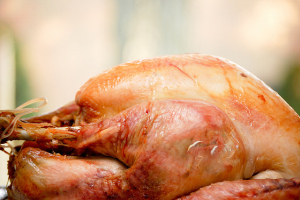With Thanksgiving just around the corner, many Floridians have opted to try a new spin on the holiday staple – deep fried turkey. While the results can be delicious, deep frying can also be quite dangerous. In fact, the use of outdoor gas-fueled turkey fryers require turkeys to be immersed in a large quantity of cooking oil at extremely high temperatures, which can ultimately release hot oil during the cooking process that can leave you and your neighbors, guests and loved ones with devastating burns and catastrophic injuries as well as put your home at risk for property damage.
According to the National Fire Protection Association, Thanksgiving Day yields the highest number of cooking fires in the United States. Cooking fires are also the number one cause of home fires that cause an annual average of 390 deaths, 4,800 injuries and $771 million in property damage. With that said, the NFPA also reports that deep fryer fires cause an average of 5 deaths, 60 injuries and more than $15 million in property damage every year.
As turkey frying peaks more and more interests, the number of fryer-related injuries and fires are on the rise. According to State Farm Insurance claims data from 2005-2010, the state of Florida ranks seventh in the top 10 states for Thanksgiving Day cooking fires. The other nine states with the most turkey fire-related insurance claims include Texas, Illinois, Ohio, New York, Pennsylvania, Michigan, Minnesota, Indiana and Louisiana.
To reduce the risk of deep fried disasters this holiday, follow these safety tips:
1. Avoid Filling Your Pot With Excess Oil – When a fryer contains too much oil, the odds the oil will spill out of the pot when the turkey is submerged is high. If the oil makes contact with a burner a major fire can arise. Read and follow all instructions with your cooking pot or fryer and make sure oil does not exceed the proper level.
2. Properly Thaw Your Turkey Before Dropping It Into the Oil – Placing a frozen or partially frozen turkey into a fryer can cause the hot oil to spill, which can result in a significant fire or burn injury. Do not thaw your turkey by using water, instead wait the proper amount of time until your turkey is fully thawed and then slowly release it into the pot so that splashing and spills are avoided.
3. Place Your Turkey Fryer On A Level Surface – Many fryer fires start on a structure or deck, so make sure you place your outdoor fryer on a firm and non-combustible surface. It is best to keep the fryer off of wooden surfaces and a safe distance away from buildings. Because many fryers are top-heavy it is essential to keep them on a level surface so that they do not tip over.
4. Don’t Leave Your Fryer Unattended – Remember that when you fry a turkey you are using grease or oil that is combustible, so do not walk away from a hot fryer. There are fryers that do not have thermostat controls and if unattended, the oil could ignite from extreme temperatures.
Should a cooking fire arise…
1. Get yourself and your loved ones away from the fire immediately. If the fire is in the house, closing the door behind you once you are outside may help to contain the fire.
2. Call 911 as soon as you can.
3. If you try to extinguish the fire, do not use ice or water. It is best to have an extinguisher approved for cooking or grease fires nearby should an emergency erupt.
4. Small grease fires can be contained by having a lid nearby when cooking that can smother grease fires. By placing the lid over the pan and turning the stovetop off, the fire can be smothered easily. The pan should remain covered until it is thoroughly cooled.
5. If an oven fire should arise, keep the oven door shut and turn the heat completely off.
Due to the risks of severe property damage and serious bodily injuries associated with frying turkeys, the NFPA advises that for those craving fried turkey this holiday season to purchase one already fried from a local specialty food or grocery store. No matter how you choose to prepare your turkey this year, the Florida Personal Injury Lawyers at Whittel & Melton, LLC advise you to exercise extreme caution and wish you and your loved ones a safe holiday season.
Continue reading
 Lots of people choose to fry their turkeys instead of cook them in the oven. Those who fry their bird usually use outdoor turkey fryers that are connected to some type of gas source, like propane. In fact, according to the Insurance Institute for Business and Home Safety, more than one-third of fires involving turkey fryers take place in someone’s garage or patio. With that said, if you are frying a turkey this year, make sure you are a safe distance away from trees or buildings. Turkey fryers should be kept off all wooden structures, like patios and decks, at all times.
Lots of people choose to fry their turkeys instead of cook them in the oven. Those who fry their bird usually use outdoor turkey fryers that are connected to some type of gas source, like propane. In fact, according to the Insurance Institute for Business and Home Safety, more than one-third of fires involving turkey fryers take place in someone’s garage or patio. With that said, if you are frying a turkey this year, make sure you are a safe distance away from trees or buildings. Turkey fryers should be kept off all wooden structures, like patios and decks, at all times. Florida Personal Injury Lawyers Blog
Florida Personal Injury Lawyers Blog


